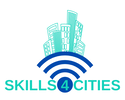|
CEDEFOP is helping the European Commission, EU Member States and the social partners to develop the right European VET policies and has created a recent policy brief in relation to the smart and green city (SGC). According to the policy brief "VET for smart cities and the green transition" published by CEDEFOP on August 16, 2022, the European Green Deal (EGD), which aims to give a response to the problems related to climate change and environmental degradation, could be positively affected by vocational education and training (VET) practices. A smart city is considered to be so when it has the relevant technologies to transmit information in an autonomous and efficient way. The information is collected through different technologies, sensors or networks and once analysed, it is used in an efficient way to contribute to the improvement of the urban environment. These activities are often related to transport, water waste or air quality, among others. According to CEDEFOP’s policy brief, both green and digital transitions together could give an impulse to the performance of the green deal and achieve its main goals and priorities. This city model encourages green practices that help to reduce the carbon footprint, such as urban agriculture, forestry, and green infrastructures. In addition, smart cities are based on taking actions that help the environment, such as: encouraging investment in green transport options, increasing renewable energy production, making buildings more energy efficient and prioritising sustainable waste management. In order to follow these steps and achieve an EU green deal ensuring no net emissions of greenhouse gases by 2050 and economic growth decoupled from resource use, municipal authorities must actively participate, through policies, in the introduction of this new model and its practices. Moreover, it will be essential to introduce VET activities so that their citizens have the relevant training and skills and can be part of this new society and contribute with it to their new jobs. Therefore, VET should explore areas of competences such as transversal skills, disruptive technologies, smart city projects domains and smart cities challenges. Through the learning of these competences, the individuals will develop and train on skills, such as creative thinking, learning by experience or analytical skills. With the SKILLS4CITIES project we aim to develop and test learning and validation tools for the training of experts, personnel and managers of smart cities for their newly emerging roles. The project supports the development of competence maps, referent competence frameworks, recognition and validation of new curricula and training materials. As a result, the initiative promotes new career routes for the workers, managers, and specialists in smart cities who are now entering the workforce. Author @IDEC References: CEDEFOP. (2022, August 16). VET for “smart” cities and the green transition. Retrieved August 22, 2022, from https://www.cedefop.europa.eu/en/news/vet-smart-cities-and-green-transition European Commission. (2019, October 12). A European Green Deal. European Commission - European Commission. Retrieved August 23, 2022, from https://ec.europa.eu/info/strategy/priorities-2019-2024/european-green-deal_en This article concerns the smart city platform of the city of Burgas and represents a good practice for creating smart cities. The case of Burgas, the second largest city on the Bulgarian Black Sea coast, is based on more than 8 years of history, when it was the beginning of the adoption and development of this concept in the seaside city. The information about this case is taken from an article. IntroductionMany smart city projects have been implemented most of which concerns the integrated smart systems for managing urban aspects such as mobility (bicycle, pedestrian, traffic control, parking control, public transport), waste management (separate collection and recycling), environmental monitoring (air pollution, water level) and the risks of adverse events, video-monitoring in urban areas, public sites and transport sites, in favor of improving the quality of life of citizens and their active involvement in planning for the future of the city. Based on what has already been completed, the challenge now is the city to upgrade individual systems and strive to multiply their benefits by integrating data into a common, intelligent urban platform, in which and through which city data can be shared, analysed and visualised. The Platfrom Smart BurgasSmart Burgas collects data from the various smart devices and systems operating in the urban environment. It is an integrated monitoring platform which helps the city by contributing to transparency, facilitates control, has a positive impact on the organisation of services and significantly improves the quality of life of the citizens. With the help of the innovative urban platform residents and guests of the city can now easily observe what is happening around them. The Project - All the Data in One PlaceThe city of Burgas already operates a large number of sensors and smart devices communicating within a well-developed infrastructure. Gaining experience in using existing systems and realising the need to increase the city's efforts to spend more intelligently on city resources by using high-tech systems and innovative practices, the city management did the next step – integration of different urban systems into a single urban platform, through which experts and citizens can share and use integrated city data. The Content of the PlatformThe city platform allows users to watch real-time video streaming from city video recording cameras. The dashboard synthesises data on road conditions, city traffic, streets being repaired, parking spaces, sports spots, beach weather, air pollution and water levels. One can get informed about how and where one can dispose of municipal waste for recycling. Investors are offered information about the vacant terrains in the industrial zones, as well as statistics about the companies operating in Burgas with location and number of employees. In the platform one can find information about Burgas mobile device applications and the city cultural and historical landmarks. In the surveys and polls module residents can give their heavy assessment for urban planning and development. UsersThe platform offers a powerful tool supporting the implementation of smart city development. It provides new opportunities for collecting, processing and analysing data on various aspects of urban development. Data can be used, depending on access levels, by:
BenefitsFor residents and guests of Burgas
For the municipal administration
For experts and service providers
FundingThe Smart Burgas project is funded and developed by the Municipality of Burgas. Regulatory FrameworkThe Smart Burgas project is implemented in compliance with the requirements of the following normative acts and strategic documents:
As in all similar cases, the platform is open for day-to-day suggestions on improvement of its functioning - here Author @KISMC |
AuthorSkills4Cities Archives
February 2023
Categories
All
|
|
The Smart Skills for Smarter Cities [Skills4Cities] Project No. 2020-1-BG01-KA202-079071 has been co-funded by the Erasmus+ Programme of the European Union.
This website reflects the views only of the author, and the European Commission cannot be held responsible for any use which may be made of the information contained therein |
SKILLS4CITIES |
SUPPORT |
Copyright ®2021 SKILLS4CITIES. All rights reserved.




 RSS Feed
RSS Feed
